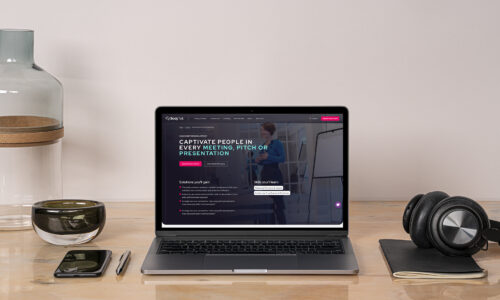“An important component is authenticity. It means being genuine, authentic, and heartfelt in one’s personal interactions with others.“
What Is Personal Impact, And Why Is It Important In The Workplace?
Every conversation you have is an opportunity. Whether you’re presenting in a boardroom or navigating a high-stakes meeting, your personal impact matters.
In this blog, we’ll explore what personal impact really means, why it matters today, and how to strengthen it.
At Body Talk, we’ve helped people across 46 countries communicate with purpose. Now, we’re sharing the tools that work, so you can show up with purpose, lead with conviction, and inspire action wherever you go.
What is personal impact?
Some might call it charisma; others say it’s good communication skills, but personal impact is your influence on other people. It’s the mark that you leave on them after an interaction. It’s how you carry yourself and present yourself to others and how you make them feel. With good presentation skills, you can leave a good impression.
Why is personal impact important?
So why is it important in business, and why should you be aware of your personal impact?
On a basic level, it can be the difference between success and failure. If you can positively impact those around you, you’re more likely to be successful in achieving your goals. People with strong personal impact are typically seen as leaders and are more likely to be promoted and given responsibilities.
We all know the importance of building relationships and creating a positive environment. If you can be the type of person that people want to be around, you’ll be more likely to succeed. Those with great personal impact are typically better at networking, which is a key skill in any career.
Another, and perhaps most important, component is authenticity. It means being genuine, authentic, and heartfelt in one’s personal interactions with others.
Explore our personal impact training courses, choose the option that works for you, and tell us about your ambitions – we’re here to make them happen.
Personal impact skills: What is positive personal impact?
How can you measure your personal impact skills, and what things should you consider if you want to strengthen them? Let’s consider some of the key elements of personal impact.
Emotional Intelligence
Being emotionally intelligent means being aware of and able to manage your own emotions and the emotions of others. It’s an important skill because it allows you to better understand and connect with those around you. Those who are emotionally intelligent are typically better at managing relationships, listening, handling conflict, and networking, all of which are important attributes in the modern-day workplace. Emotionally intelligent people are usually natural empathisers too. Empathy is the ability to understand the feelings of another or put yourself in their shoes. It’s a key component of emotional intelligence and is important in the workplace because it allows you to better relate to and connect with your co-workers.
Body Language
Body language is a form of nonverbal communication. It involves using facial expressions, gestures, posture, and eye contact to communicate your thoughts and feelings. Being aware of your body language is important because it can impact how others perceive you. For example, maintaining eye contact, smiling, and having an open stance and good posture are all nonverbal cues that convey confidence and approachability. On the other hand, if you slouch or avoid eye contact, it can make you appear nervous or unsure of yourself. Your body language also affects how you feel about yourself. Studies have shown that smiling and being expansive with gestures can boost your mood and lower stress levels.
There are a few things you can do to improve your body language. First, make sure you have good posture. Stand up straight and avoid crossing your arms, making you appear closed off. Second, make eye contact when you’re talking to someone. This shows that you’re interested in the conversation and helps build rapport. Finally, use facial expressions that match the emotions you’re trying to communicate. If you’re excited or pleased, show it on your face. If it’s a more serious message, then change your expression. We refer to this as being congruent – where your body language, tone of voice and message are fully aligned.
How you speak
Your tone of voice, words, and overall communication style all play a role in how others see you. A warm tone of voice conveys approachability and makes people more likely to want to talk to you. People may be less likely to want to interact with you if you’re perceived as harsh or judgmental. Consider the words you use too, and avoid jargon or technical terms. Instead, focus on using clear and concise language that gets your point across without sounding overly complicated.
Listening skills
Good communication is more about listening than you talking. When you listen, you show that you value what the other person has to say. You also avoid interrupting or speaking over them, which can come across as disrespectful. Active listening involves hearing what someone is saying and trying to understand their point of view. This means paying attention, making eye contact, and asking questions if clarification is needed.
Why does personal impact matter in the workplace?
- Colleagues – Think about when someone made a great impression on you at work. Chances are, they exhibited some of the qualities we’ve discussed, like good body language, a warm tone of voice, and active listening skills. First impressions matter, and making a positive one can go a long way in the workplace. Personal impact is also important in the workplace because it can affect your career trajectory. If you’re up for a promotion, the decision-makers will likely consider how you interact with others and whether you positively or negatively impact those around you. Similarly, if you’re looking to switch jobs, employers will often ask for references or speak to your current co-workers to get a sense of working with you.
- Stakeholders – Personal impact is also important for communicating with stakeholders. It helps build rapport and trust, you’ll come across as confident and easy to work with, and stakeholders will be more likely to engage with you. Authentic personal impact can also help you influence the outcome of negotiations or other interactions. Stakeholders may be more inclined to agree with you or offer favourable terms if you can create a positive impression.
- Business Owners – While personal impact is important for everyone in the workplace, it’s especially crucial for business owners. As the face of their company, they need to effectively communicate with a wide range of stakeholders, from employees and clients to investors and partners. They also need to be able to build trust and rapport quickly to create positive relationships. Good personal impact can help business owners do all of this and more.
How can personal impact be improved?
You can do a few things if you feel you need to work on your personal impact. First, take a step back and assess how you currently come across to others. Do you make eye contact? How is your body language? What kind of words do you use? After identifying areas that could use improvement, start making small changes. If you tend to cross your arms, consciously keep them uncrossed and use more open gestures. If you speak quickly and use jargon, slow down and use simpler language. Perhaps you interrupt people mid-sentence; try listening more and speaking less.
It’s also helpful to be aware of the different communication styles and how they can be effective in different situations. Assertive communication is common in business but can also come across as aggressive. A passive communication style may be more appropriate when dealing with a sensitive issue. The key is to adapt your communication style to the situation and the person you’re speaking to.
Finally, remember that personal impact is not just about how you come across to others but also how well you listen and understand them. Active listening involves hearing what someone is saying and trying to understand their point of view. This means paying attention, making eye contact, and asking questions if clarification is needed. Focusing on both sides of the conversation can build stronger relationships and improve your personal impact.
Make a lasting impression with personal impact coaching
We offer personal impact training for all budgets and group sizes. From one-to-one coaching to masterclasses for 250 people, we’d love to discuss how we can help you achieve your goals.


















